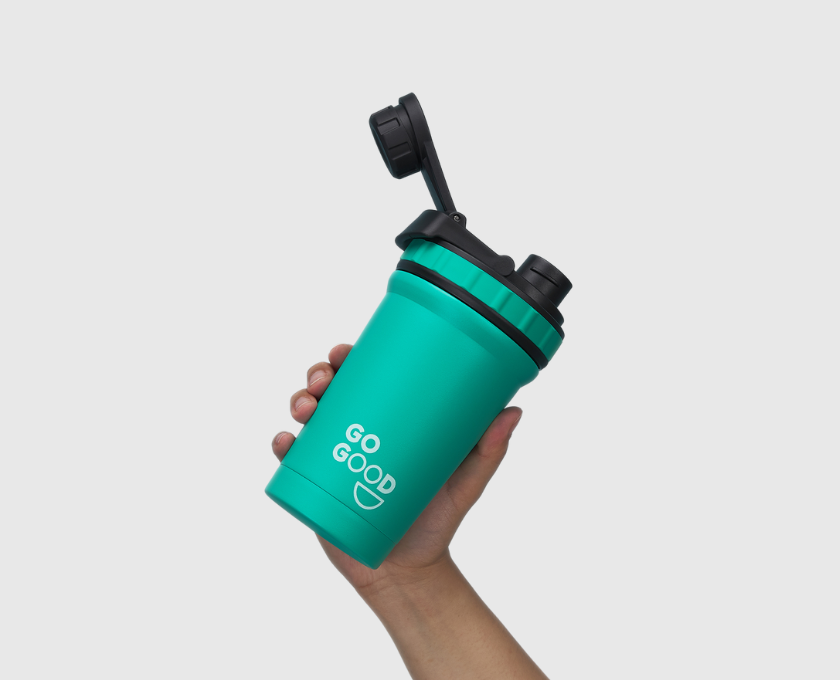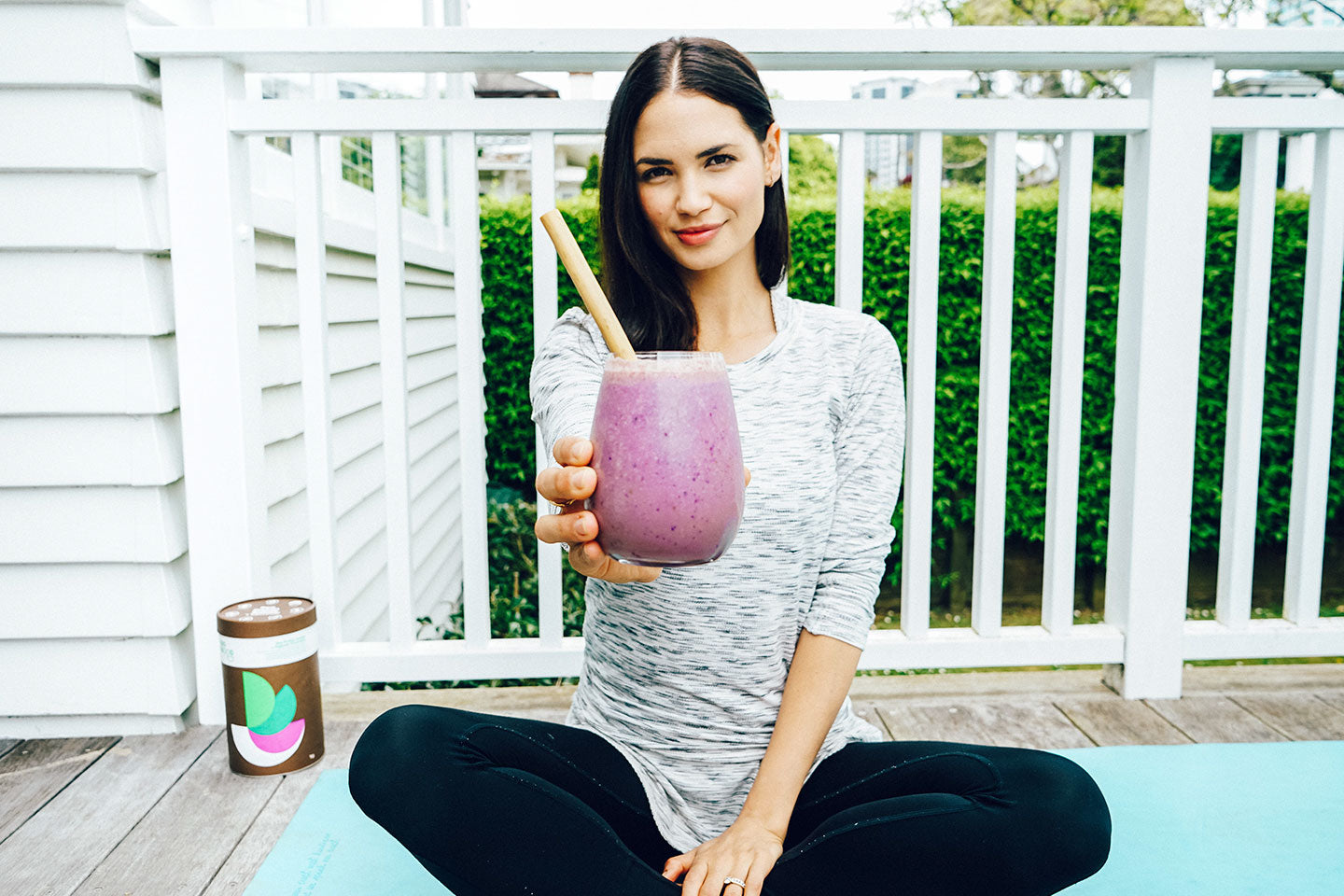The question of how much protein your body needs for baseline function, and how much protein your body needs to thrive have two very different answers.
General Requirements
Recommendations for the general population advise that for women 0.75g of protein per kg of body weight and 0.84g/kg for men is sufficient to meet daily requirements. However, whether this amount is optimal or simply suffi- cient is debatable. For the average woman, this equates to 46g of protein daily which might look like 1 grilled chicken breast, 1 slice of multigrain bread, 1 boiled egg and 10 almonds throughout the day - far from what we would typically eat.
The latest science recommends that for optimal weight management we should eat at least 1.2g/kg protein each day (10). For the average woman, this equates to 74g of protein daily which means adding the equivalent to an extra cup of trim milk, 100g of tofu and ¼ can of kidney beans to the above list each day while keeping a reduction in total energy consumed – a fair bit harder to achieve.
People With Higher Protein Needs
For a large subgroup of the population, the above protein recommendations may not quite cut it. Athletes and the highly active, pregnant and breastfeeding women, sprouting teenagers, and people suffering from illness all have heightened protein requirements to assist in repair, recovery, and growth.
Distribute your protein across meals where possible by aiming to include 15-25g at each mealtime and as soon as possible after exercising to help maximise protein synthesis.
Do Athletes Need More Protein?
The short answer: yes – and not just for gym-goers!
Protein is not simply important for the bodybuilder wanting to bulk up, endurance athletes and highly active individuals also share increased demands. The exact amount of protein optimal for athletes is one of the major nutrition controversies. Studies that our current recommendations are based on have been largely conducted in males which puts a little bit of guesswork into the recommendations for females.
What we do know for sure is that during training, you use more muscles than your average couch potato which causes little rips and strains to occur requiring protein to mend.
With insufficient intake, this increased protein turnover can result in a prolonged recovery from exercise and risk muscular wasting (3).
Adapt Your Protein Intake To Your Goals
The amount of protein you need depends on your weight and lifestyle. Increase and adjust your protein intake according to your goals and activity levels.
It’s difficult to determine your exact protein needs as this will vary based on the duration, frequency, intensity and type of training you are doing (6). In general, the higher the intensity, the higher your protein requirement, but the following guidelines can be used:

Quality Matters
Keep in mind more doesn’t always equal better. Think about the quality of protein and keeping your sources varied to ensure you’re getting a complete range of the essential amino acids.

Do Men And Women Need The Same Amount Of Protein?
More often than not, women are lighter than men, according to the above equations, this makes their protein requirements lower. Also, females typically have more fat mass (28%) than males (15%), it has been suggested that this may cause women to have a slightly lower requirement of nitrogen (which comes from protein) per kg of body weight than men. In fewer words – females require less protein.
However, the muscle building response to protein and exercise is the same in men and women.
Females and males often have very different fitness goals. While there will still be a population of females going for muscle gains, a large proportion are focused on getting lean, toned and potentially even losing weight.
Women also critically need more protein through specific life events such pregnancy, lactation and menopause.
Pregnancy And Breastfeeding
There does come a time for some women where their protein requirements skyrocket – pregnancy and lactation. During pregnancy and lactation, the recommended intakes of the protein rise to help a new mum grow extra tissue and combat losses to support the growth of her baby.
What Are The Benefits Of Consuming Enough Protein?
Benefits of dietary protein include better appetite control, metabolic boost, reduced cravings, improved body composition and reduced energy intake.
Fuller For Longer
Our diets provide an invaluable source of this powerful protein which is great news considering protein can prevent us from overeating and help us regulate our bodyweight. How on earth does it do that? Well, studies have revealed that eating protein at every meal helps you feel fuller for longer.
Take for example an afternoon snack where you have the choice of a). a serve of flavoured crackers / biscuits or b). a serve of Edamame Beans (both snacks have the same amount of energy, ~500kJ energy). Studies have shown us that by choosing the Edamame Beans which has an extra 8g of protein, you will feel satisfied for longer, preventing tendencies to overeat (5).
Burn More Fat
A high-protein diet contains high concentrations of the leucine amino acid which works with insulin to burn fat and retain muscle (6). If losing weight is your goal, a high-protein diet in combination with exercise shall be your best ally (7). If muscle strengthening and building interests you, dietary protein is critical. Dietary protein has been linked to increased strength, increased size, and increased performance (8).
Finally, high protein foods are generally low in added sugar, and if selected well, can be low in saturated fats too. These factors are both favourable in the formation of a heart-healthy diet.

Do I Need A Protein Supplement?
The reason to supplement with a protein powder is the fact that you are not consuming enough protein from whole food in regards of your goals.
Why Use Protein Supplementation
Are you feeling hungry more than you’re not? Do you feel yourself getting sick or run-down easier than you used to? Do you have thin or damaged nails, hair or skin? Are you struggling to gain muscle mass? Are your muscles sore for a prolonged time after a workout? If you’re answering yes to some of these questions, it could be worth increasing your protein intake – by food or supplement.
While some people may meet their protein requirements through food alone, and have no need for supplements, others may struggle and find it more convenient, cost-effective and comfortable to choose a protein supplement instead.
After all, taking a salmon fillet to the gym to replenish your protein stores may not help your reputation in the changing-rooms. If you’re struggling to find the motivation to cook or keep forgetting to put a post-gym high-protein snack in your car, protein powder might just be your new best friend.
Vegetarian And Vegan Diet
Protein powders may also be of particular benefit to those on a calorie-restricted diet as it provides a highly concentrated protein source in a less energy-dense form. Vegans and vegetarians particularly will benefit from protein supplements as plant-based foods are generally lower in protein than animal-based products making daily requirements harder to reach.
How Much Protein Is Too Much?
Acceptable Macronutrient Distribution Ratios
Whether or not you can reach a point of having too much protein is hotly contested by researchers. There comes a point where consuming protein above your requirements may not provide any further benefit. New Zealand does not have an upper limit on our protein recommendations, however, it does advise that no more than 25% of your total energy intake should come from protein (9). The Institute of Medicine has different ideas stating that up to 35% of your energy can come from protein.
The Food and Agricultural Organisation in 1997 recommended that protein intakes should be limited to 2g of protein for each kg of body weight for the general population. Until more long-lasting studies have been carried out on the effects of high-protein diets, this recommendation remains. In saying that, New Zealand has recognised that for some highly active people, and specific groups of people, higher intakes may be of further benefit.
Potential Side Effects
One article that has sparked public debate on protein intake recommendations is the effect of consumption on calcium levels. Understandably, for women whose calcium intake recommendations are inherently quite high, this may raise concern.
Keeping your intake of calcium around 20mg to every 1g of protein will help to reduce any concerns with a protein-associated calcium loss. Allow yourself to be a judge by listening to your body’s needs and if you are consistently consuming protein in excess of 2g/kg/BW, think about clearing it with a health professional
New to Go Good Protein?
Receive 15% OFF your first order with code START at the checkout. International shipping available on all orders. Free shipping in NZ on orders over $99. Shop now!
REFERENCES
1. Mann J, Truswell S, Essentials of Human Nu- trition. Oxford: Oxford University Press, Incorporat- ed; 2014. Available from https://books.google.co.nz/books?hl=en&lr=&id=a6t0DgAAQBAJ&oi=fnd&pg=PP1&d- q=1.+Mann+J,+Truswell+S,+editors.+Essentials+of+Hu- man+Nutrition.+Oxford:+Oxford+University+Press,+Incorpo- rated%3B+2014.&ots=cr5rB9CTu-&sig=tf1kZB5NB6Vjsro_eEb- NHDUBOTA&redir_esc=y#v=onepage&q&f=false
2. Alberts B, Johnson A, Lewis J, et al. Molecular Biology of the Cell. 4th edition. New York: Garland Science; 2002. The Shape and Structure of Proteins. Available from: https://www.ncbi. nlm.nih.gov/books/NBK26830/
3. Shang N, Chaplot S, Wu J. 12 - Food proteins for health and nutrition. In: Yada RY, Proteins in Food Pro- cessing (Second Edition): Woodhead Publishing; 2018.301-36. Available from https://books.google.co.nz/ books?hl=en&lr=&id=boeZDgAAQBAJ&oi=fnd&pg=PP1&d- q=Yada+RY,+editor.+Proteins+in+Food+Processing+(Sec- ond+Edition)&ots=gKCMAYMVbz&sig=uFJunY051n7MYjJ- S6tQUnQjuqVw&redir_esc=y#v=onepage&q&f=false
4. Henley EC, Taylor JRN, Obukosia SD. Chapter 2 - The Impor- tance of Dietary Protein in Human Health: Combating Protein Deficiency in Sub-Saharan Africa through Transgenic Bioforti- fied Sorghum. In: Taylor SL, editor. Advances in Food and Nu- trition 60: Academic Press; 2010. p. 21-52. Available from https://books.google.co.nz/books?id=z2zGYAtZYTcC&p- g=PA21&dq=Chapter+2+-+The+Importance+of+Dietary+Pro- tein+in+Human+Health:+Combating+Protein+Deficien- cy+in+Sub-Saharan+Africa+through+Transgenic+Bioforti- fied+Sorghum&hl=en&sa=X&ved=0ahUKEwjr6fC8xuvkAhUIX- SsKHYPhC7IQ6AEIKDAA#v=onepage&q=Chapter%202%20-%20The%20Importance%20of%20Dietary%20Protein%20 in%20Human%20Health%3A%20Combating%20Protein%20 Deficiency%20in%20Sub-Saharan%20Africa%20through%20 Transgenic%20Biofortified%20Sorghum&f=false
5. Lu N, Zhou Chapter 13 - Whey Protein-Based Nutrition Bars. In: Deeth HC, Bansal N, editors. Whey Proteins: Academic Press; 2019. p. 495-517. Available from https://www.elsevier. com/books/whey-proteins/deeth/978-0-12-812124-5
6. Bean A. Complete Guide to Sports Nutrition. 1st ed. ed. London: Bloomsbury Publishing; 2013. Available from https://books.google.co.nz/books?hl=en&lr=&id=zAL- oDAAAQBAJ&oi=fnd&pg=PP1&dq=6.%09Bean+A.+Com- plete+Guide+to+Sports+Nutrition.+1st+ed.+ed.+Lon- don:+Bloomsbury+Publishing%3B+2013.&ots=mG1Kgpx- hoz&sig=2CFfimcGzDwDXG9K3SMo5xjrQGA&redir_es- c=y#v=onepage&q=6.%09Bean%20A.%20Complete%20 Guide%20to%20Sports%20Nutrition.%201st%20ed.%20 ed.%20London%3A%20Bloomsbury%20Publishing%3B%20 2013.&f=false
7. Sorrenti V, Caudullo G, Lucignano F, Fortinguerra S, Zusso M, Giusti P, et al. Chapter Eighteen - Personalized sports nutrition: Role of nutrients in athletic performance. In: Barh D, Ahmetov II, editors. Sports, Exercise, and Nutritional Genomics: Ac- ademic Press; 2019. p. 411-31. Available from https://www. elsevier.com/books/sports-exercise-and-nutritional-genomics/ barh/978-0-12-816193-7
8. Morton RW, Murphy KT, McKellar SR, Schoenfeld BJ, Hensel- mans M, Helms E, et A systematic review, meta-analysis and meta-regression of the effect of protein supplementation on resistance training-induced gains in muscle mass and strength of healthy adults. Br J Sports Med (2017). Available from https://bjsm.bmj.com/content/52/6/376.abstract
9. National Health and Medical Research Council, Australian Government Department of Health and Ageing, New Zealand Ministry of Health. Nutrient Reference Values for Australia and New Zealand. Canberra: National Health and Medical Research Council; 2006. Available from https://www.nhmrgov.au/sites/ default/files/images/nutrient-refererence-dietary-intakes.pdf
10. Healthy Food Guide. How to shift stubborn kilos. 2019. Available from https://www.healthyfood.com/advice/how-to- shift-stubborn-kilos/



















